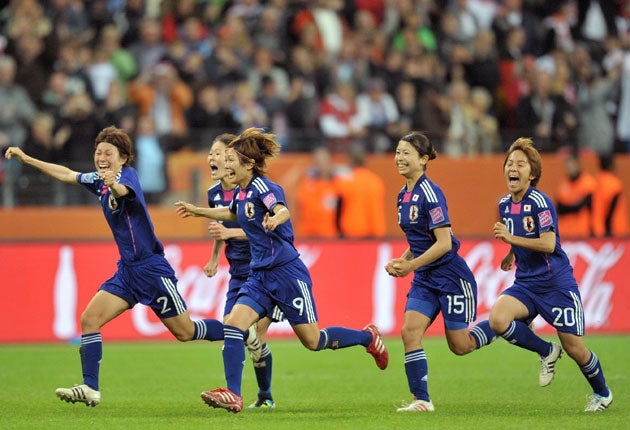Japan's joy: from nuclear disaster to World Cup triumph

Among the proudest supporters of Japan's fairy tale World Cup victory against the US women's team were thousands of workers at the crippled Fukushima nuclear power plant. And for good reason: two of their former colleagues play for the national team.
The star of Japan's women's outfit may have been captain Homare Sawa, who sealed her rightful place as perhaps Asia's greatest female player with a last-minute 2-2 equaliser in Sunday's final in Frankfurt. But the tournament's most remarkable stories surely belong to Aya Sameshima and Karina Maruyama.
Midfielder Maruyama and defender Sameshima worked at the Daiichi nuclear plant before the 11 March earthquake and tsunami that led to the world's worst nuclear crisis since Chernobyl in 1986. Both have friends still involved in the dangerous fight to clean up the disaster.
Among the more unorthodox dressing-room tactics employed by Japan's coach, Norio Sasaki, were video screenings of post-meltdown Fukushima, a strategy designed to motivate the team's players. It seems to have worked: after an emotional group screening before the game against home favourites Germany last week, Maruyama went out and knocked in the giant-killing winning goal deep into extra time.
By day, Sameshima and Maruyama worked in the offices of the power plant, operated by Tokyo Electric Power Co (Tepco), and in the evenings trained with the company-sponsored team, Tepco Mareeze. Among the many once-unthinkable developments since 11 March has been the transformation of their former training ground into a base camp for the fight against the nuclear disaster. Instead of athletes, men in radiation suits and masks now file through the village daily on their way to and from the plant, the sort of post-apocalyptic scenario often rehearsed in manga comics.
The tale of Sameshima and Maruyama capped a victory almost too good to be true: an underdog team playing against far superior opposition for a country struggling to recover from one of its worst natural disasters. Japan's team had lost to the United States in 25 previous encounters and their diminutive, wiry athletes were dwarfed by their opponents. The team's nickname, Nadeshiko, a sturdy pink flower, came to symbolise the players' graceful, unexpected resilience.
Few Japanese even knew the women's team had gone to Frankfurt and almost nobody expected them to win. It took Maruyama's goal against Germany to awaken the nation to the highly charged drama inside the Japanese dressing room.
Their fighting spirit, and the sense that the World Cup had taken on a significance for Japan that the Americans couldn't imagine, arguably gave the smaller, weaker side the edge and lent the game an emotional, almost mythical edge. Around Tokyo, thousands crammed into bars to watch the kick-off at 3.45am, cheering wildly when Sawa scored following a corner kick two minutes from the end.
Subscribe to Independent Premium to bookmark this article
Want to bookmark your favourite articles and stories to read or reference later? Start your Independent Premium subscription today.

Join our commenting forum
Join thought-provoking conversations, follow other Independent readers and see their replies